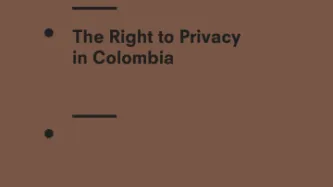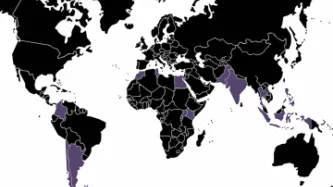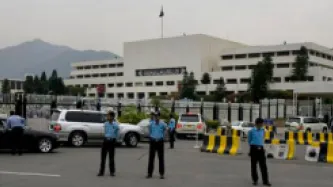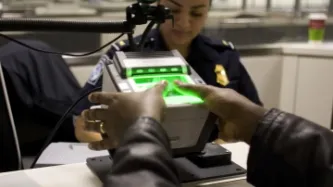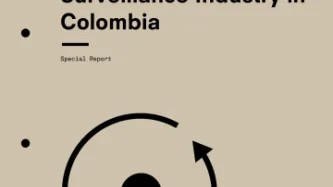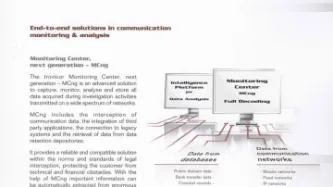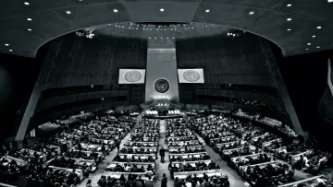Search
Content type: Advocacy
Article 17 of the International Covenant on Civil and Political Rights (ICCPR) provides for the right of every person to be protected against arbitrary or unlawful interference with his privacy, family, home or correspondence as well as against unlawful attacks on his honour or reputation. Any interference with the right to privacy can only be justified if it is in accordance with the law, has a legitimate objective and is conducted in a way that is necessary and proportionate. Surveillance…
Content type: News & Analysis
Today, Privacy International is publishing the result of a global effort to benchmark surveillance policies and practices in the countries that are part of the Privacy International Network. We're calling it the 'State of Surveillance'.
We designed a survey of questions based on some key issues: statistics about the communications infrastructure of the country; what civil society organisations and groups that analyse privacy issues; the international and domestic legal framework…
Content type: Long Read
The Investigatory Powers Tribunal (“IPT”) today held that GCHQ hacking of computers, mobile devices and networks is lawful, wherever it occurs around the world. We are disappointed that the IPT has not upheld our complaint and we will be challenging its findings.
Our complaint is the first UK legal challenge to state-sponsored hacking, an exceptionally intrusive form of surveillance. We contended that GCHQ hacking operations were incompatible with democratic principles and human rights…
Content type: News & Analysis
This guest post was written by Nighat Dad and Adnan Chaudhry of Digital Rights Foundation.
It is the role of the state to protect its citizens from threats to their life and liberty. But in protecting its citizens, the state’s own aims cannot be counterproductive and erode the security found in rights like privacy and freedom of expression that are vital to a democratic system.
However, it has too often been the case that governments will pursue and enact legislation that provides more…
Content type: News & Analysis
This is a guest piece. It does not necessarily reflect the views or position of Privacy International.
In 1997, plans for a Civil Identification Registry (RIC) were signed into law in Brazil, promising to unify the 27 regional identification registries into a centralized federal one by 2020. The law, which was only enacted in 2010, continues to face obstacles to its implementation, but in 2014 there was a renewed wave of support for the project from the Ministry of Justice…
Content type: News & Analysis
Photo: Flickr/Elvert Barnes. Some rights reserved.
In the wider civil society space, the opportunities for travel come thick and fast. From the multi-stakeholder perspective, the Internet Governance Forum will be held during November in João Pessoa, Brazil. There is the Stockholm Internet Forum in, naturally, Stockholm. In freedom of expression there is the International Freedom of Expression Exchange Strategy Conference in Trinidad & Tobago, while End…
Content type: Press release
Privacy International's new report exposes the companies that have built the Colombian Government's controversial and highly invasive surveillance systems. The report “Demand/Supply: Exposing the Surveillance Industry in Colombia” shows the extensive dealings that companies from Israel, the UK, the USA, Finland, and New Zealand, among other countries, have had in supporting Colombian government agencies in purchasing surveillance equipment. Many of the company's customers were agencies that did…
Content type: News & Analysis
Over a dozen international companies are supplying powerful communications surveillance technology in Colombia, according to a Privacy International investigation released today featuring original documentation. Over the past few decades, companies primarily from Israel, the US, and the UK have worked with Colombian partners to expand the Government's surveillance capacities. This is despite evidence that the Government is undertaking unlawful surveillance of Colombians.
The…
Content type: Report
Over a dozen international companies are supplying powerful communications surveillance technology in Colombia. Privacy International examines the actors across the world involved in facilitating state surveillance.The report is available in English and Spanish.
Content type: Report
For nearly two decades, the Colombian government has been expanding its capacity to spy on the private communications of its citizens. Privacy International's investigation reveals the state of Colombia's overlapping, unchecked systems of surveillance, including mass surveillance, that are vulnerable to abuse.
See the report in English and Spanish.
Content type: News & Analysis
“We always assume we are being watched. It is part of our understanding,” explained Father Alberto. The clergyman knows what it's like to live under surveillance. Father Alberto is Executive Secretary of the Inter-ecclesiastical Commission for Justice and Peace in Colombia, which supports displaced and conflict-affected communities in their struggle for justice. The CIJP also works in the restive Urabá region, where they document and litigate on the links between neo-paramilitary groups,…
Content type: Press release
The release of a new report by Privacy International exposes Colombia's intelligence agencies' previously unknown history of developing communications surveillance capabilities outside of lawful authority.
The report “Shadow State: Surveillance law and order in Colombia” reveals, via previously unreleased documents, the Colombian police agencies' and intelligence services' long history developing surveillance systems. Rather than building a well-regulated system of surveillance after Colombia…
Content type: News & Analysis
Every government seems to want to spy in Pakistan. The US' National Security Agency (NSA) tapped the fibre optic cables landing in Karachi, among others, and used 55 million phone records harvested from Pakistani telecommunications providers for an analysis exercise. The United Kingdom's Government Communications Headquarters (GCHQ) had a store of SIM keys from Mobilink and Telenor networks, two of the country's biggest providers.
But the Pakistani government, specifically the…
Content type: News & Analysis
On July 6th, the company Hacking Team was hacked: over 400GB of administrative documents, source code and emails are now available for download.
Documents from the hack confirm once again the claims made in our report Their Eyes on Me, the Moroccan intelligence services made use of Hacking Team's spyware 'Remote Control System' to target those whom they perceive as their opponents. The documents show the two intelligence agencies in the country have been renewing their contracts and…
Content type: News & Analysis
Here are eight things we have learned from this week's hack of some 400GB of internal company material and correspondence from Italian surveillance company Hacking Team.
The Citizen Lab was right
The Citizen Lab, who in 2014 identified some 21 countries that are potential customers of Hacking Team, were right about all of them. A 2015 report stated that there was likely to be more. In fact, at least 45 countries are purchasers of Hacking Team's…
Content type: News & Analysis
Lebanon was part of the drafting committee for the Universal Declaration of Human Rights, and by co-sponsoring both UN General Assembly resolutions on the right to privacy in the digital age (December 2013 and December 2014), Lebanon has recently reaffirmed its commitment to its obligations to uphold the right to privacy.
And yet, Lebanon's progressive positions on the right to privacy at the UN could not be further away from the situation in the country itself.
Once seen as…
Content type: News & Analysis
This guest blog is written by Hisham Almiraat, co-founder of Mamfakinch.com and Director of the 'Association des droits numériques' (ADN), an organisation working on human rights and technology in Morocco.
Mamfakinch was launched in February 2011, in the wake of the Tunisian and Egyptian revolutions. Its goal was to offer an open forum for all dissenting voices. The website received over a million unique visitors in the first few weeks after it was launched. It quickly…
Content type: News & Analysis
Privacy International today is releasing a report about surveillance in Morocco, featuring four interviews with individuals who have been subjected to state surveillance. Stepping away from our traditional approach to documenting surveillance, we decided to give a platform to the people who have been targeted.
The interviews reveal a multi-layered oppressive system, where law enforcement agents film the keyhole of your door and interrogate your neighbours where; nationalist hacker groups get…
Content type: News & Analysis
German surveillance technology company Trovicor played a central role in expanding the Ethiopian government's communications surveillance capacities, according to a joint investigation by Privacy International and netzpolitik.org.
The company, formerly part of Nokia Siemens Networks (NSN), provided equipment to Ethiopia's National Intelligence and Security Service (NISS) in 2011 and offered to massively expand the government's ability to intercept and store internet…
Content type: News & Analysis
This Sunday is International Women's Day. You could celebrate the considerable progress in legislating for women's equal rights. You could join a protest against political and legal inequality, discrepancies in women's access to healthcare, education and other social goods. You could thank your mom for delivering you.
Here at Privacy International, we want to commemorate the importance of this day by looking at some of the ways surveillance technologies can be used to control women and how the…
Content type: News & Analysis
The focus on the right to privacy continues at the United Nations, with Kenya, Turkey, and Sweden being recently challenged over their surveillance practices during the Human Rights Council's Universal Periodic Review of States' human rights records.
The explicit mention of the right to privacy in recommendations submitted by Slovenia and the Netherlands during the review of Sweden, in the recommendation by Estonia during Turkey's review, and Liechtenstein's recommendations to…
Content type: News & Analysis
In a recent trip to Colombia, Privacy International learned that the Colombian mobile phone network does not use any form of encryption. In this sense, Colombian communications are stuck in the 1990s, where cryptography was not yet widespread, and was still tightly controlled by governments who feared its spread could threaten their capabilities to conduct surveillance.
The issue of encryption on mobile phones though is not unique to Colombia. The Director of the FBI has been on a media blitz…
Content type: News & Analysis
Last year, UK-based surveillance company Gamma TSE sold the Indonesian military US$ 6.7 million worth of equipment as part of the military's weapons modernisation effort. As early as 2005, Indonesian officials were soliciting the advice of a close partner of Gamma, Germany-based Elaman, to create technical surveillance unit (TSU), according to a white paper published as part of the WikiLeak SpyFiles and found in the Surveillance Industry Index.
Gamma and Elaman are…
Content type: News & Analysis
3 June 2014
The following article written by Carly Nyst, Privacy International's Legal Director, originially appeared on the Future Tense blog on Slate:
The news that the CIA is no longer using vaccination programs as a front for spying operations may come as a relief to many humanitarian workers. Yet their fears should not be completely assuaged, because the CIA’s activities—which undoubtedly threatened the safety of humanitarian workers and those they seek to help—pale in…
Content type: News & Analysis
This year, an advanced surveillance system called the "Platform for Unified Monitoring and Analysis" will come online in Colombia. Frustrated with the the previous system, Esperanza, which only monitored telecommunications activity, the Colombian authorities turned to PUMA (Plataforma Única de Monitoreo y Análisis), a system that will allow them to monitor both telecommunications traffic and IP traffic in one source. The system, now based on Police property in Western Bogota, will now be…
Content type: News & Analysis
Surveillance companies selling mass and intrusive spy technologies to human rights-abusing governments often are benefitting from the financial and institutional support from their home government, revealing a more closely-linked relationship between the sector and the State than previously believed.
Recent revelations concerning the funding of Hacking Team's surveillance technology with public money highlights the role of states in funding the development of surveillance…
Content type: News & Analysis
As anticipated, the Snowden revelations – first referred to in the opening session as the “elephant in the room” – soon became the central focus of many of the 150 workshops that took place during the 8th Internet Governance Forum (IGF) in Bali, and dominated the bilateral meetings that took place between governments, the private sector, the tech community, and civil society.
The various stakeholders arrived at the IGF ready to pursue their own agendas. The U.S. came to try and restore…
Content type: News & Analysis
The Zimbabwean government extended its reach into the private lives of its citizens this week by promulgating a new law establishing a central database of information about all mobile telephone users in the country. The Statutory Instrument 142 of 2013 on Postal and Telecommunications (Subscriber Registration) Regulations 2013, gazetted last Friday, raises new challenges to the already embattled rights to privacy and free expression in Zimbabwe, increasing the potential that the…
Content type: News & Analysis
The development agenda is heralding a new cure-all for humanitarian and development challenges – data.
In the latest incarnation of the development world’s dominant paradigm, ICTs for Development, data is being embraced, analysed and monitored by companies, humanitarian organisations, aid donors and governments alike. Yet despite the promises of data evangelists that big and open data can revolutionise innovation, education, health care and infrastructure, the potential risks of…
Content type: News & Analysis
All across the U.S. on 4 July, thousands of Americans gathered at Restore the Fourth rallies, in support of restoring the Fourth Amendment of the U.S. Constitution and to protest the recently-disclosed information regarding NSA spying on American citizens. Demonstrations took place in over 100 cities, calling on the U.S. government to respect the privacy rights of citizens in America and individuals around the world.
With all this talk of constitutional …
